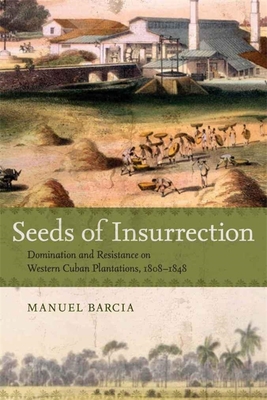

 Louisiana State University Press
Louisiana State University Press
Seeds of Insurrection: Domination and Resistance on Western Cuban Plantations, 1808-1848


Key Metrics
- Manuel Barcia
- Louisiana State University Press
- Hardcover
- 9780807133651
- 9.1 X 6.2 X 1 inches
- 1.05 pounds
- History > Caribbean & West Indies - Cuba
- English
 Secure Transaction
Secure TransactionBook Description
On a late September day in 1837, shortly after sunset, a group of six slaves marched into the small Cuban village of G�ira de Melena, beating African drums and singing loudly. Alarmed, villagers rushed into the streets with machetes, sabers, and spears, ready to take action against the disobedient slaves. Yet this makeshift parade never evolved into the violent rebellion the villagers expected. Though the slaves who lived on Cuban coffee and sugar plantations sometimes defied their captors by orchestrating fierce uprisings and committing murder and suicide, they also resisted in less overt ways--by running away, feigning sickness, breaking tools, and by maintaining their own cultures. In Seeds of Insurrection, Manuel Barcia examines many largely overlooked ways in which African and Creole slaves in Cuba defied domination in the first half of the nineteenth century.
Ethnic and geographic origins, as well as slaves' personal experiences, affected their resistance to bondage. Dividing resistance into two broad types--violent and nonviolent--Barcia examines when and why the slaves chose certain forms. Creole slaves grew up in Cuba, for example, so they learned both the language of their ancestors and Spanish, and they came to understand their Spanish masters as few African-born slaves ever could. Consequently, they cleverly used the few rights colonial laws offered them to their advantage. African-born slaves, by contrast, carried with them their memories from home, their religious beliefs, jokes, and songs, and they dealt with enslavement by incorporating this cultural heritage into their everyday activities. Barcia demonstrates the ways in which the slaves made use of the privacy of their huts and barracks and the lack of surveillance in the fields to voice their ideas and opinions--through song, religion, gossip, folktales, and jokes--within an acceptable degree of safety.
Relying primarily on transcripts of local and central court proceedings involving slaves, free people of color, slave owners, and witnesses, Barcia reveals the slaves' view of their world. He also explores the forms of domination practiced by colonial authorities, plantation masters, and overseers, gleaning insight from innovative sources, including medical reports and diaries of rancheadores, as well as public and private correspondence, newspapers, and the contributions of contemporary scholars.
In Seeds of Insurrection, Barcia expands the definition of resistance and adds an invaluable dimension to the understanding of slavery in the Americas.
Author Bio
I studied History at undergraduate level at the University of Havana. I then took a Masters in Comparative History and a PhD in History at the University of Essex. After concluding my PhD I went on to teach at the universities of Essex and Nottingham before coming to Leeds in 2006.
My research focuses on the history of slavery and the slave trade in the nineteenth-century Atlantic world. I am also a contributor to The Washington Spectator, The Huffington Post, The Independent, The Daily Telegraph, and Al Jazeera in English.
In 2014 I was awarded a prestigious Philip Leverhume Prize in History, given every year to researchers whose work has already attracted international recognition and whose future career is exceptionally promising. I have been a non-resident fellow at the Hutchins Center's Afro-Latin American Institute (Harvard University) and a visiting fellow at the Gilder Lehrman Center for the Study of Slavery, Resistance, and Abolition (Yale University).
I am currently working on a new project that will examine western policies to suppress ‘piracy’ in the nineteenth century across the world.
Source: University of Leeds
Community reviews
Write a ReviewNo Community reviews





